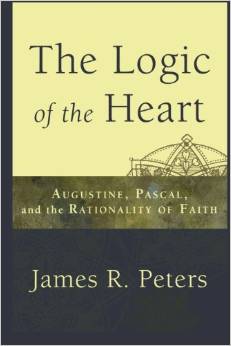James Peters: The Logic of the Heart
 James R. Peters, The Logic of the Heart: Augustine, Pascal, and the Rationality of Faith. (Grand Rapids, MI: Baker Academic, 2009), 300 pages.
James R. Peters, The Logic of the Heart: Augustine, Pascal, and the Rationality of Faith. (Grand Rapids, MI: Baker Academic, 2009), 300 pages.
This book is not for the faint of heart or the non-academic reader of philosophy. James R. Peters wraps his thesis around abstract conceptualizations, while he weaves loquacious arguments throughout his book. The text is thickly worded and the reader is urged to keep a dictionary nearby. Essentially, Peters posits a philosophical middle way that balances rationality and mysticism. He proposes that the rationality of the heart must become entangled neither in the objectivity of Modernity, nor in the subjectivity of post-Modernity. In doing so, Peters engages the foundational rationalists (Descartes and Hume) of Modernity conversationally with the mysticism of Augustine and Pascal.
There are two principle difficulties with this book. First, it is elitist in its use of language and written exclusively to the academic community. In doing so, its genre is generally inaccessible to the layperson. Indeed, it is so unapproachable that it may characterize the elitist genre whereby no academic dares to proclaim that the emperor has no clothes, for if one has the courage to confess that Peters is incomprehensible, then one risks the accusation of being dull of mind. Second, Peters has two simultaneous conversations that compete for the reader’s attention. One is in the body of the text and the other is in the footnotes. As a reviewer of this book, it is a noteworthy distraction and one would prefer to see the two conversations merged and the footnotes reserved for reference citations.
How then can someone untrained comprehend this book? We offer three suggestions: First, read the ending first so that you will see the target that the author is aiming at. Second, read the concluding segment of each chapter so that you will discern the logical steps that the author has taken to achieve his goal. Finally, read the introduction to each chapter. Once the reader has a basic understanding of Peters’ theme for the book, then one can begin to explore the depths of his argument. To approach the book with the mindset of reading it front-to-back will undoubtedly find the reader lost before the end of the first chapter.
Reviewed by John R. Miller
Preview The Logic of the Heart: books.google.com/books?id=USJFI8wgQRwC
Category: In Depth


